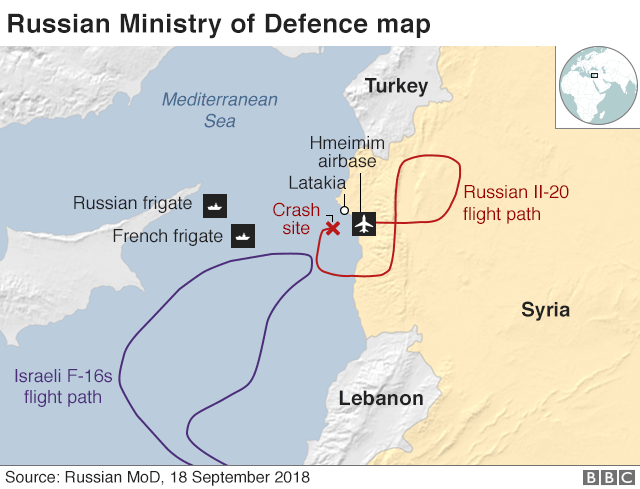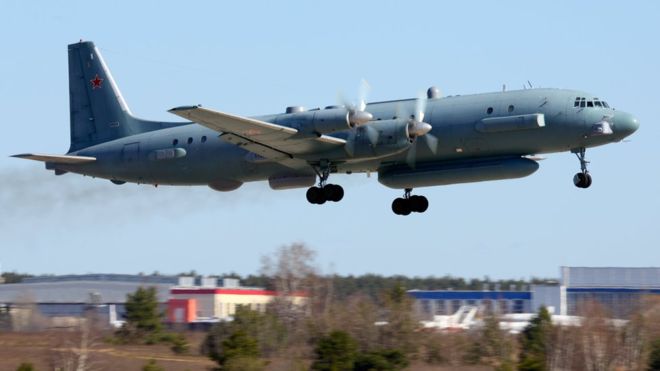srael says Syria is to blame for the deaths of 15 Russian aircrew shot down by Syrian forces after Israel launched an air raid on the city of Latakia.
Israel “expressed sorrow” for the deaths but blamed “extensive and inaccurate” Syrian anti-aircraft fire.
The Il-20 plane was downed over the Mediterranean Sea on Monday evening.
Russia initially blamed “irresponsible” Israeli actions, but President Vladimir Putin said on Tuesday it was “a chain of tragic accidental circumstances”.
Russia is supporting President Bashar al-Assad in Syria’s civil war.
What has Israel said?
In a rare statement detailing its operations over Syria, the Israel Defense Forces (IDF) said: “Israel expresses sorrow for the deaths of the aircrew members of the Russian plane that was downed due to Syrian anti-aircraft fire.
“Israel holds the Assad regime, whose military shot down the Russian plane, fully responsible for this incident.”
The statement also laid blame on Iran and the Lebanese Shia militant group, Hezbollah, two other allies of the Syrian government.
The Israeli government is concerned by what it calls Iran’s “military entrenchment” in Syria, as well as shipments of Iranian weapons to the Hezbollah.
The IDF said its jets were targeting Syrian military facilities “from which systems to manufacture accurate and lethal weapons were about to be transferred on behalf of Iran to Hezbollah in Lebanon”.
The statement also addressed a Russian allegation that Israeli planes had “used the Russian airplane as a cover”, putting it “in the line of fire coming from Syrian air defence systems”.
The IDF said: “During the strike against the target in Latakia, the Russian plane that was then hit was not within the area of the operation… when the Syrian army launched the missiles that hit the Russian plane, (Israeli) jets were already within Israeli airspace.”
What did the Russians say had happened?
Russia’s Tass news agency said the Ilyushin Il-20 reconnaissance plane had “disappeared during an attack by four Israeli F-16 jets on Syrian facilities in Latakia province”.
The downing was reported to have occurred about 35km (22 miles) from the Syrian coast as the Il-20 aircraft was returning to Russia’s Hmeimim airbase near Latakia.

In an initial statement, Russia said Israel’s “irresponsible actions” were to blame, saying it was given less than a minute’s warning ahead of the strikes, which was not enough time to get the military surveillance plane out of the way.
“The Israeli planes deliberately created a dangerous situation for surface ships and aircraft in the area,” a defence ministry spokesman said.
“As a result of the irresponsible actions by the Israeli military, 15 Russian servicemen have died.”
The defence ministry said body fragments, personal belongings and the plane’s debris had been found by search ships in the Mediterranean on Tuesday.
What is the diplomatic fallout?
In a phone call on Tuesday, Russian Defence Minister Sergei Shoigu told his Israeli counterpart Avigdor Lieberman the blame “fully rests with Israel”, adding that Russia “reserves the right to take further steps in response”.
Russia also summoned the Israeli deputy ambassador to its foreign ministry.
But later President Putin appeared more conciliatory, saying that the Russian response would be to secure the safety of its personnel.
Israel also appears to want to ease any damage to relations.
Its military vowed to share any relevant information with Moscow and an Israeli diplomatic source said Prime Minister Benjamin Netanyahu was expected to speak to President Putin.
An Israeli military official recently said it had hit more than 200 Iranian targets in Syria over the past 18 months, with Russia largely turning a blind eye, a situation Israel would want to continue.
Are the accusations fair?
Analysis by Jonathan Marcus, BBC Defence Correspondent
Russia’s anger is real. But the question is, are the Russians attributing blame fairly? The charges are two-fold. Long-standing and up to now effective information-sharing broke down.
The Israeli Air Force has Russian-speaking air traffic controllers able to communicate with their Russian opposite numbers. But Moscow says they were informed of the Israeli raid with only one minute’s notice.
Secondly, Russia charges – more seriously – that the Israelis used the large radar signature of the Ilyushin turbo-prop to mask their own aircraft.
But the radar signatures of the relatively slow Ilyushin and four nimble F-16 jets are radically different.
Furthermore, the Syrian air defences should have known the Russian plane was in-bound, whatever the Israelis were doing.
There may be several contributory factors in this tragedy. Russia cannot publicly castigate its Syrian allies. In private things may be rather different.
Why is a Russian aircraft in Syria?
Russia began military strikes in Syria in 2015 after a request from President Assad, who has stayed in power despite seven years of civil war which has so far killed more than 350,000 people.
In an initial statement, Russia said Israel’s “irresponsible actions” were to blame, saying it was given less than a minute’s warning ahead of the strikes, which was not enough time to get the military surveillance plane out of the way.
“The Israeli planes deliberately created a dangerous situation for surface ships and aircraft in the area,” a defence ministry spokesman said.
“As a result of the irresponsible actions by the Israeli military, 15 Russian servicemen have died.”
The defence ministry said body fragments, personal belongings and the plane’s debris had been found by search ships in the Mediterranean on Tuesday.
What is the diplomatic fallout?
In a phone call on Tuesday, Russian Defence Minister Sergei Shoigu told his Israeli counterpart Avigdor Lieberman the blame “fully rests with Israel”, adding that Russia “reserves the right to take further steps in response”.
Russia also summoned the Israeli deputy ambassador to its foreign ministry.
But later President Putin appeared more conciliatory, saying that the Russian response would be to secure the safety of its personnel.
Israel also appears to want to ease any damage to relations.
Its military vowed to share any relevant information with Moscow and an Israeli diplomatic source said Prime Minister Benjamin Netanyahu was expected to speak to President Putin.
An Israeli military official recently said it had hit more than 200 Iranian targets in Syria over the past 18 months, with Russia largely turning a blind eye, a situation Israel would want to continue.
Are the accusations fair?
Analysis by Jonathan Marcus, BBC Defence Correspondent
Russia’s anger is real. But the question is, are the Russians attributing blame fairly? The charges are two-fold. Long-standing and up to now effective information-sharing broke down.
The Israeli Air Force has Russian-speaking air traffic controllers able to communicate with their Russian opposite numbers. But Moscow says they were informed of the Israeli raid with only one minute’s notice.
Secondly, Russia charges – more seriously – that the Israelis used the large radar signature of the Ilyushin turbo-prop to mask their own aircraft.
But the radar signatures of the relatively slow Ilyushin and four nimble F-16 jets are radically different.
Furthermore, the Syrian air defences should have known the Russian plane was in-bound, whatever the Israelis were doing.
There may be several contributory factors in this tragedy. Russia cannot publicly castigate its Syrian allies. In private things may be rather different.
Why is a Russian aircraft in Syria?
Russia began military strikes in Syria in 2015 after a request from President Assad, who has stayed in power despite seven years of civil war which has so far killed more than 350,000 people.
The Russian military said in April of this year it had also spent 18 months helping to rebuild the air defence system, according to the UK’s Guardian newspaper.
Hmeimim is Russia’s main base for air strikes on rebel groups in Syria – strikes that have enabled President Assad’s forces to recover much lost ground since 2015.
Russia says its air strikes only target “terrorists”, but activists have said they mainly hit mainstream rebel fighters and civilians.
According to The Syrian Observatory for Human Rights, a UK-based monitoring group, at least 7,928 civilians and 10,069 combatants have been killed in Russian strikes.
Russia has also suffered personnel losses, including the deaths of 39 people when a Russian military transport plane crashed as it attempted to land at Hmeimim in March.











